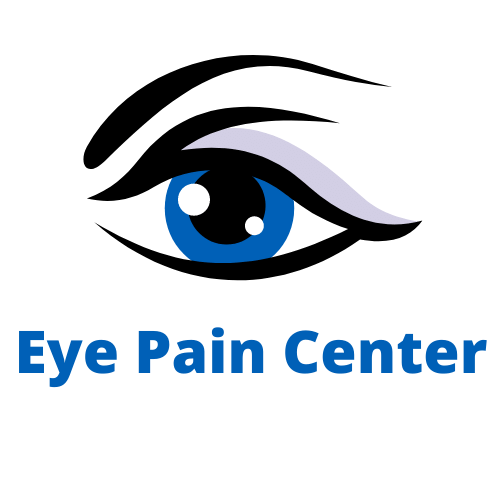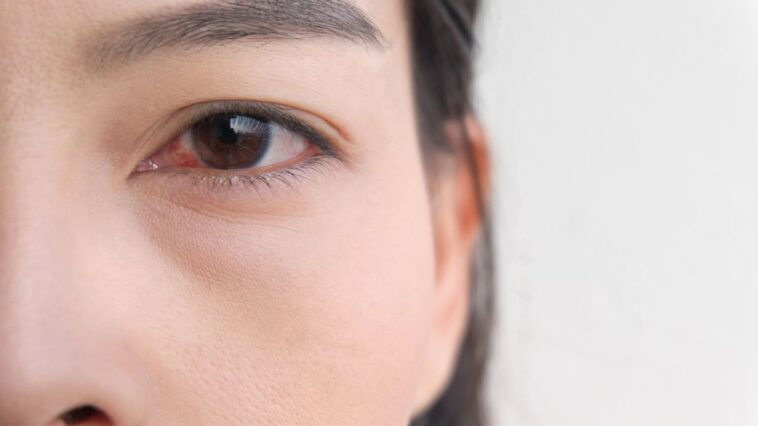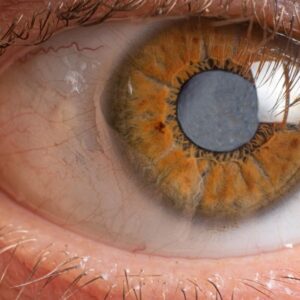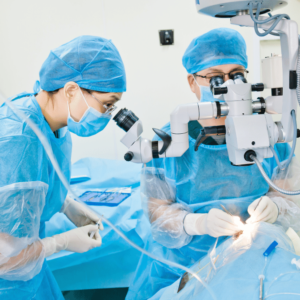Dry eye is a common condition in which the eyes do not produce enough tears, or the tears produced are of poor quality. This can cause discomfort, itching, burning, stinging, redness, and a feeling of grittiness in the eyes. In severe cases, it can damage the eye surface and cause vision problems.
What Causes Dry Eyes?
Dry eyes can be caused by many factors, including:
- Age: As you age, the tears your eyes produce may decrease, making dry eye syndrome more of a problem for older adults. Reduced tear production can lead to dryness, irritation, and discomfort in the eyes.
- Medications: Certain medications, such as antihistamines, decongestants, blood pressure medications, and antidepressants, can reduce tear production and cause dry eyes.
- Medical conditions: Dry eyes can be caused by a variety of factors. Environmental conditions and certain medications, like antihistamines, decongestants, blood pressure medications, and antidepressants, can reduce tear production and lead to the condition.
- Hormonal changes: Dry eyes are a common condition, especially among those undergoing hormonal changes, such as those experienced during menopause. During such periods, the body’sbody’s tear production can be significantly reduced, leading to dry eye issues.
- Environmental factors: Wind or dry air can cause tear evaporation and contribute to dry eyes. Additionally, staring at electronic devices for extended periods, such as computers and smartphones, can lead to this condition.
- Eyelid problems: Eyelid problems such as abnormally shaped eyelids or lack of complete closure can result in inadequate distribution of tears over the surface of the eye and may lead to dry eyes
- LASIK surgery: Dry eye is a side effect that can occur due to LASIK surgery or other types of refractive surgery. When dry eyes occur after these surgeries, the patient may experience burning, itching, and irritation. These symptoms can interfere with vision and lead to an increased risk of infection if left unchecked.
See an eye doctor if you experience symptoms of dry eyes, as untreated, dry eyes can lead to more serious problems and affect your vision.
Signs and Symptoms of Dry Eyes
The following are common signs and symptoms of dry eyes:
- Eye discomfort: A feeling of dryness, itching, burning, stinging, or grittiness in the eyes.
- Tearing: Excessive tearing, which may seem paradoxical, responds to the eye’seye’s dryness.
- Redness: Redness of the eyes, particularly in the inner corners.
- Blurred vision: Blurred vision, especially when reading or using a computer for an extended time.
- Eye fatigue: Eye fatigue, especially after reading or using a computer for an extended time.
- Light sensitivity: Increased sensitivity to light or photophobia.
- Stringy mucus: The presence of stringy mucus in or around the eyes.
- Eye soreness: Soreness or aching in the eyes.
If you experience any of these symptoms, seeing an eye doctor for an accurate diagnosis and appropriate treatment is essential. It is also important to have a comprehensive eye exam, as dry eyes can sometimes be a symptom of a more serious underlying condition.
Treatments for Dry Eyes
The following are common types of treatment for dry eyes:
- Artificial tears: One of the best treatments for this condition is artificial tears; these are available over the counter and provide a soothing effect on the eyes. Some types of tears contain ingredients that can help stabilize the tear film and reduce evaporation, making your eyes feel more comfortable.
- Prescription eye drops: prescription eye drops may be recommended to help increase tear production and reduce inflammation in the eyes. Eye drops come in many forms and can help soothe dry eye symptoms, offering relief and relaxation.
- Warm compresses: Warm compresses, such as placing a warm washcloth on the eyes, can effectively unblock meibomian glands and improve tear quality in dry eye sufferers.
- Lid hygiene: Proper lid hygiene is essential when you have dry eyes. This includes scrubbing your eyelids gently with a warm, moist washcloth. Doing so can remove any debris or oils that might clog your meibomian glands and exacerbate the condition.
- Punctal plugs: Punctal plugs, which are small, removable devices that are inserted into the tear ducts, can help retain tears on the surface of the eyes and reduce dryness.
- Nutritional supplements: Omega-3 fatty acid supplements, such as fish oil, can help improve the quality of the tears and reduce inflammation.
- Surgery: In severe cases of dry eyes, surgery, such as a procedure to close the tear ducts (punctal occlusion) or to repair the eyelids (blepharoplasty), may be recommended.
See an eye doctor to determine the best treatment plan for your dry eyes, as different treatments may work better for different people and causes of dry eyes. A combination of treatments may also be recommended, depending on the severity and cause of your dry eyes.
Managing Lifestyle Factors to Reduce Symptoms
In addition to medical treatments, there are also lifestyle changes you can make to reduce the symptoms of dry eyes:
- Blink frequently: Tears are essential for keeping the eye’s surface moist and lubricated, and regular blinking helps spread them across your eyes evenly. So remember to take frequent breaks when using a computer or reading for long periods, and ensure you’re blinking regularly.
- Increase humidity: Dry air can exacerbate dry eyes, so increasing the humidity in your environment can help. This can be done using a humidifier, especially during the winter when indoor air tends to be drier.
- Limit screen time: Dry eyes can be caused by prolonged use of electronic devices like computers and smartphones. To protect your eyes and avoid dryness, it’s essential to take frequent breaks and adhere to the 20-20-20 rule – every 20 minutes, look away from the screen for 20 seconds, gazing at something in the distance that is approximately 20 feet away.
- Wear protective eyewear: The best way to reduce the severity of this common eye condition is by wearing protective eyewear such as sunglasses or goggles. This can help reduce tear evaporation and prevent further irritation in your eyes.
- Avoid irritants: Avoid exposing your eyes to irritants, such as cigarette smoke, air pollution, and harsh chemicals.
- Drink plenty of water: Drinking an adequate amount of water may help reduce the signs and symptoms of dry eyes, as it can help keep your tears from evaporating too quickly.
- Modify your diet: Incorporate foods high in omega-3 fatty acids, such as fatty fish. These can help improve the quality of tears and reduce inflammation, offering considerable relief for those suffering from dry eye syndrome.
It is important to remember that everyone is different, and what works for one person may not work for another. If you are having trouble managing dry eye symptoms, you must see an eye doctor for a comprehensive evaluation and personalized treatment plan.
Am I At Risk For Dry Eyes?
Anyone can get dry eyes! So, yes, you can be at risk too.
However, there are more chances if:
- You are above the age of 50 or 50.
- You wear contact lenses that are not for dry eyes.
- You have an autoimmune disorder or any other such condition.
- You are a female.
- You are not taking enough Vitamin A in your diet.
Supplementation Tips for Maximum Comfort
There are several dietary supplements that you can take to help improve the symptoms of dry eyes:
- Omega-3 fatty acids: Omega-3 fatty acids, such as EPA and DHA, can help improve tear quality and reduce inflammation. You can find these fatty acids in supplements or foods such as fatty fish, flaxseeds, and chia seeds.
- Vitamin A: Integrating foods rich in Vitamin A into one’s diet can help to alleviate Dry Eye symptoms. Foods such as carrots, sweet potatoes, and leafy greens are all good sources of Vitamin A that can benefit those suffering from Dry Eyes.
- Vitamin C: it is essential to incorporate food sources with vitamin C into your diet. These include citrus fruits, bell peppers, and strawberries – all great sources of this essential antioxidant that can reduce oxidative stress in the eyes.
- Vitamin E: A meaningful way to help combat dry eyes is by including antioxidant-rich foods in your diet, such as almonds, sunflower seeds, and avocados, which are all great sources of vitamin E. Vitamin E is an essential nutrient for promoting healthy eye function and may help protect the delicate tissues of the eyes from oxidative stress.
- Zinc: Zinc is essential for maintaining the health of the cornea and other eye parts. To treat this condition, foods Rich in zinc are recommended, such as oysters, beef, chickpeas, and other sources that contain high amounts of zinc.
It is important to note that supplements should not be used as a substitute for a balanced diet and should always be taken under the supervision of a healthcare professional. See an eye doctor for a comprehensive evaluation, and a personalized treatment plan for dry eyes is also essential.
When to See an Eye Doctor
You should see a doctor for dry eyes if you experience any of the following symptoms:
- Persistent dryness, itching, or burning in your eyes
- Increased sensitivity to light
- Blurred or fluctuating vision
- Eye fatigue or discomfort after prolonged computer use or reading
- Excessive tearing, which can occur as a result of tear ducts overcompensating for dryness
- Redness or swelling of the eyes
- Difficulty wearing contact lenses
If you experience any of these symptoms, seeing an eye doctor for a comprehensive evaluation and discussing the best ways to manage and prevent dry eyes is essential. Your doctor may recommend a combination of lifestyle changes, over-the-counter or prescription eye drops, or supplements to help reduce your symptoms and improve the health of your eyes.
Conclusion
Dry eyes are a common condition affecting millions worldwide. It is caused by a decrease in tear production or an increase in tear evaporation, leading to dryness, itching, and discomfort in the eyes.
Several factors can increase the risk of developing dry eyes, including age, medical conditions, medications, and environmental factors.
It is crucial to identify and address any underlying causes to manage dry eyes, maintains a healthy lifestyle, and use appropriate treatments such as artificial tears, warm compresses, and supplements. Sometimes, prescription eye drops or other treatments may be necessary to help relieve symptoms.
If you are experiencing symptoms of dry eyes, seeing an eye doctor for a comprehensive evaluation and personalized treatment plan is essential. Proper management and treatment can reduce dry eye symptoms and improve your eyes’ health.






